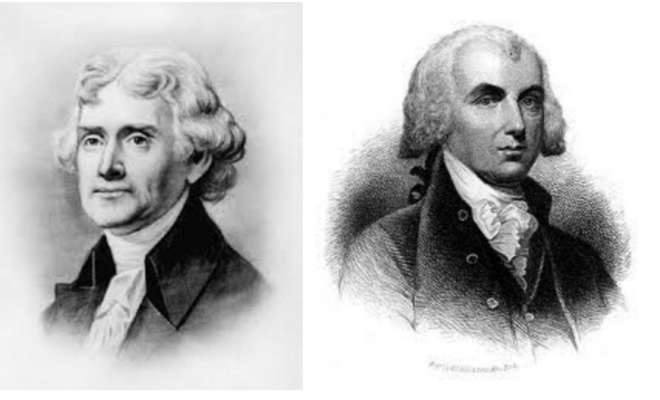Most people today have little to no familiarity with any of the principles that influenced the founders. Below, you’ll find six important resources hand-picked by Thomas Jefferson and James Madison. You can also find links to each in this podcast episode – “The Founders’ Education.”
The government-run school system teaches virtually nothing about the principles of liberty – and natural rights. It teaches little to nothing about the founding principles underlying the Constitution.
This ignorance is a big part of why things have gone so far off the rails – and it shouldn’t be surprising, either. Jefferson put it this way:
“If a nation expects to be ignorant & free, in a state of civilisation, it expects what never was & never will be.”
Understanding the Constitution requires much more than discussing what it takes to be eligible for president or reading charts with titles like “How a Bill Becomes a Law.” It requires that people know the foundations upon which the document was constructed – which benefited from ideas extending more than a thousand years.
Thankfully, we have some help from the founders themselves.
In 1783, a committee to the Confederation Congress put together a list of over 300 books considered crucial to the founding generation. The authors of the list included James Madison of Virginia, Thomas Mifflin of Pennsylvania, and Hugh Williamson of North Carolina. Plus, Thomas Jefferson also had a similar list at that time (the “1783 catalogue”) – and he was rooming at Madison’s boarding house, where they most certainly conversed on the subject of a reference library for Congress.
Years later, Madison and Jefferson worked together on another essential reading list as members of the University of Virginia Board of Visitors.
Here, Madison and Jefferson – along with George Loyall, John H. Cocke, and Joseph C. Cabell – gave us six essential resources to understand “the general principles of liberty and the rights of man in nature and in society.”
Here they are – starting with two foundational books:
- John Locke – An essay concerning the true original extent and end of civil government
You may be familiar with it under the name Two Treatises
Many of Locke’s ideas found their way into the Declaration of Independence, including the notion that governments derive their just power from the consent of the governed.
“The state of nature has a law of nature to govern it, which obliges every one: and reason, which is that law, teaches all mankind, who will but consult it, that being all equal and independent, no one ought to harm another in his life, health, liberty, or possessions.”
Podcast – Illegitimate Government: John Locke on Tyranny
- Algernon Sidney – Discourses on Government
Sidney is a guy that almost no one knows about today, but they should. This was on pretty much everyone’s list of essential books at the time of the founding – including Madison’s 1783 list, Benjamin Franklin, John Adams – and more.
Thomas Jefferson called it “the best elementary book of the principles of government, as founded in natural right, which has ever been published in any language.”
It’s hard for us to imagine a better endorsement.
Podcast – Jefferson’s Favorite Book on Government?
The board also recommended four sources for understanding “the distinctive principles of the government of our own state, and of that of the U.S.”
- Declaration of Independence
First of these is the Declaration “as the fundamental act of union of these states.”
Podcast – Declaration of Independence: Usurpation is Treason
- Federalist Papers
Next are the Federalist Papers, calling them “an authority to which appeal is habitually made by all.” They said these essays are “rarely declined or denied by any as evidence of the general opinion of those who framed, and of those who accepted the Constitution of the U.S. on questions as to its genuine meaning.”
- Virginia Resolutions of 1798
The next source recommended by the board is the Virginia Resolutions of 1798. Passed in opposition to the Alien and Sedition Acts, these resolutions penned by Madison and passed by the Virginia legislature lay out the constitutional justification for “interposition.”
Article – A Christmas Gift from James Madison: The Virginia Resolutions of 1798
- George Washington’s Farewell Address
The final essential source is George Washington’s farewell address, or his “Valedictory Address,” as they called it. In this address, Washington covered topics including foreign policy, factions, and the danger of debt.
Podcast – Warnings Ignored: George Washington’s Farewell Address
Education Takes Work
Unlearning the government-school propaganda we’re fed from cradle to grave isn’t easy. And, as Abigail Adams wrote, “Learning is not attained by chance, it must be sought for with ardour and attended to with diligence.”
But we have the tools. You can find a recent Path to Liberty podcast covering more of the “Founders’ Education” – plus links to all 6 of these recommended sources right here.
We hope this is a useful guide for you to continue your own education in support of the Constitution and liberty.
